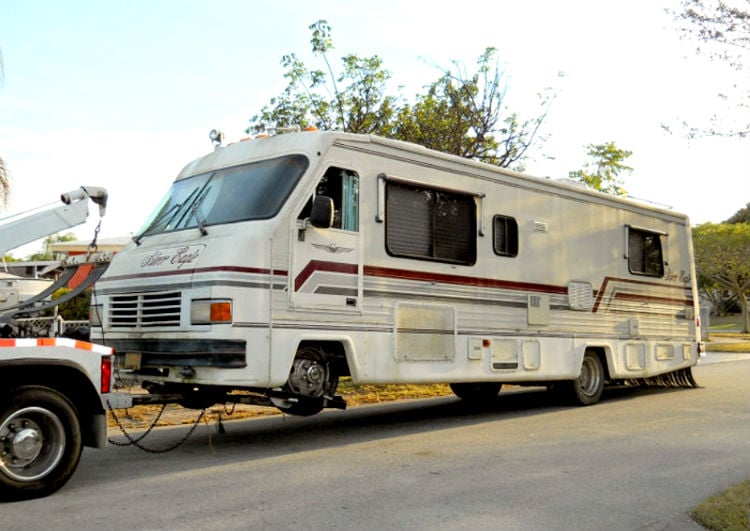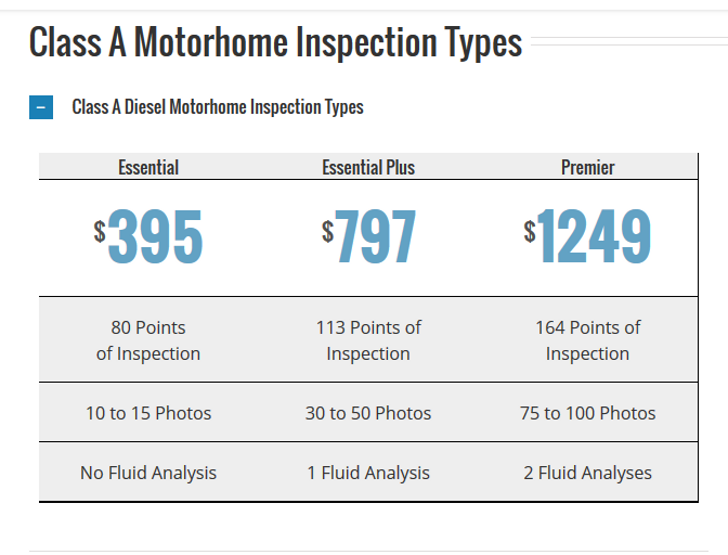The couple pulled into the RV dealership with big smiles on their faces. After a year of searching online, their dream RV was sitting in a mechanics bay, getting cleaned up and ready to go. Today they would write a check and leave with the rig on an all-new adventure.
The two full-timers thought they had done their homework. They had already owned a RV by the same manufacturer and spent the last year talking to other owners and researching the model’s pros and cons. When they finally saw the RV, it was exactly as they imagined—except for one small but curious patch on outside of the slide out’s inner wall. The service manager said he had no idea why it was there.

Spending a little up front on a complete RV inspection is the only assurance a buyer has against expensive problems that inevitably reveal themselves after the sale.
The couple thought it over and purchased the rig anyways. Then, about a month later when the first heavy rainfall hit and water dripped inside the rig down along the slide out, they realized why the patch was there. Clearly the previous owner had hit something with the slide.
The impact was so hard it threw the slide out off kilter, causing a gap between the RV frame and the slide ceiling. After many hours researching a solution, the husband was able to fix the problem by readusting the rail timing adjustment. During the ordeal the couple couldn’t help wondering, is this something that a RV inspector could have caught before the sale?
The reality of lemon laws and RVs

Nobody seems to know exactly how many used RVs are sold each year in the U.S. But companies like the RV Inspection Connection say that at least 60 percent of the estimated eight million RVs on the road are pre-owned. Whether the new owners buy privately or from a dealership, those who encounter expensive problems will be disappointed to learn that used RVs are rarely covered by state lemon laws like Florida’s.
If a state does offer lemon law protection for RVs, many exclusions apply. For example, only motorized recreational vehicles will be covered, but only the actual engine and chassis, not the living quarters. Sadly, most RV owners with lemon RVs will discover that the lemon law is not on their side. Even worse, they’ll eventually figure out that the problems were totally avoidable if they had hired an RV inspector before buying.
The value of RV inspections before buying
RVers are frugal by nature, so it’s understandable when they’re put off by the cost of an RV inspection. A good inspector will charge anywhere from a couple of hundred dollars to over a thousand, depending on the rig.
The majority of experienced RVers will pass on the inspection investment, but novice RVers and those who don’t like to get their hands dirty are well-advised to consider one. Spending a little up front on a complete RV inspection is the only assurance a buyer has against expensive problems that inevitably reveal themselves after the sale.
RV Inspectors run the gamut from “Generic Joe’s RV Inspection Service” to those inspectors with credentials from The National RV Inspectors Association (NRVIA), currently the most recognizable RV inspection service in the industry. The NRVIA is an association with a network of dues-paying RV inspectors that consumers and lending institutions can contact via the NRVIA’s commercial venture, “RV Inspection Connection.”
 NRVIA inspectors offer three levels of service for all RVs:
NRVIA inspectors offer three levels of service for all RVs:
- Level 1: Essential: General overview of the RV you are considering.
- Level 2: Essential Plus: A more in-depth review of your future RV including fluid analysis, if you are considering a motorized unit.
- Level 3: Premier: The most thorough inspection for that discerning buyer who wants to have the greatest amount of knowledge before investing their hard earned money into their RV.
The inspections vary depending on the type of RV. Here’s just one example:
You don’t have to be a math whiz to see that even a $1,249 inspection is a small price to pay when the RV of your dreams is in the shop with a $3,000 repair bill waiting for you. Despite the value, it seems that RV inspections are still the exception and not the norm. If you’re in the market for a new-to-you RV, search any RV discussion forums and you’ll find compelling evidence of the value of RV inspections. Here’s one of the best:
Pre-purchase Inspection Reveals $30k in Hidden Defects
…The moisture was found in a 6 ft strip, about 12 at the top, running down the wall immediately behind the forward slide on the driver’s side. Monaco quickly got back to me, advising that the complete sidewall would have to be replaced and that also meant a repaint. The cost, about $25,000, but the cost could be discounts somewhat if the repair was done during the slower winter season.
In summary, I was cautious and did the work required to do a professional inspection of the coach and chassis. I spent $730, which seemed to me to be greatly overpriced but ended up potentially saving myself tens of thousands of dollars and many sleepless nights.
Buying a second-hand RV is a wise move and can save you thousands of dollars—but can just as easily cost you twice (or more) that if your rig ends up being a lemon. If you’re in the market for another RV, don’t spend a dollar on one until you visit RV discussion forums and ask others for reliable, skilled RV inspectors in the state where your dream rig is located.

We bought an RV on Oct 2 2015 the dealer said in writing the RV just had a service and everything worked. We paid cash. We waited and called and waited for the title. The tags ran out March 2016, still no tags. I had to have surgery 15 hours away so we told them to give us temp tags so we can get it done. We had the surgery. on the way back the workhorse 3270 brakes failed. Pedal went to the floor and we kept going. Damaged the front end. Had it towed to garage to fix it enough to get home. Brakes work you just have to pull the pedal back up in order to discontinue use. I went to dealer, he still has not put the paperwork in to get lien off title. I had liability on rv so the damage is on me. I tried to talk the dealer into taking the RV back on the count he has not given me an RV in over 6 months. No deal. All the owner said was I will give you credit on something else on the lot. We shook. Then I get a call the next day from a sales man who says, owner changed his mind. $7000 for the damages. If I pay him he is just going to keep the money and tell the bank to take the RV back and that I caused the damages. Police will not do anything. Right now I have an RV I can’t drive (only 1 temp tag per vehicle) I don’t own.
A little bit of clarification is needed here! Is the consumer expected to pay for an inspection pre-purchase? What is in it for the purchaser? Meaning if I fork over $1200 for an inspection, and a $25,000 repair bill is revealed. Is that going to give me enough negotiating leverage, to recoup the $1200 I paid out for the inspection? Sounds like lots of expectations on the consumer, without any commitment by the RV Industry. You say nothing here about, if the $1200 fee has any Guarantees of satisfaction. Ex: For $1200, we Guarantee that we will find ALL the problems with the RV. If we miss something we will compensate (Refund) the $1200 for missing the problem, that it will now cost you money to repair. But, NOTHING here indicates ANY level of competence or quality on the INSPECTORS part. To give the consumer confidence that the inspection will be complete and accurate! Just saying the inspector is NRVIA certified, is NOT a Guarantee that the consumer won’t be on the hook for a MAJOR unseen repair. I went through this with a NEW Car! Auto Dealers Association, and Mediators for a New Car (LEMON). I think the RV Industry has to step up to the plate and do something to hold each and every dealer to Standards for the consumers benefit. If not, consumers will find other things to invest in like Boats or Vacation properties. I have purchased RV’s from both private owners and dealers. One was a solid old trailer with very little problems. One had some issues with leaking. And my Motorhome had a $2500 Transmission Repair, within the first month after purchase. All 3 were used older RV’s. The Motorhome was sold at a dealership. And the dealer did put some money into the RV on new tires, belts, and hoses. But, they did NOT know that the RV sat for months without being driven or started. The Trans Repair was due to dried out gaskets and seals. IDK if the $1200 inspection would have saved me any additional money off of the $6800 I paid for my RV?
Having fluid analysis done during an inspection would have revealed the issue with the transmission.
Why are the “dealers” in these articles not identified so that other buyers can be informed. Let’s help ourselves police ourselves why wait for the industry. Otherwise what or how good are the articles if not for complaining.
We did our due diligence..paid $600 for a level 2 inspection. We had never owned one before…evidently the inspector didn’t think it important to tell us what delimitation was that covered the back half of the trailer! We can’t afford to fix it. You don’t mention any other recourse…so what if we could get ur $600 back..that won’t cover the $5000 repair bill